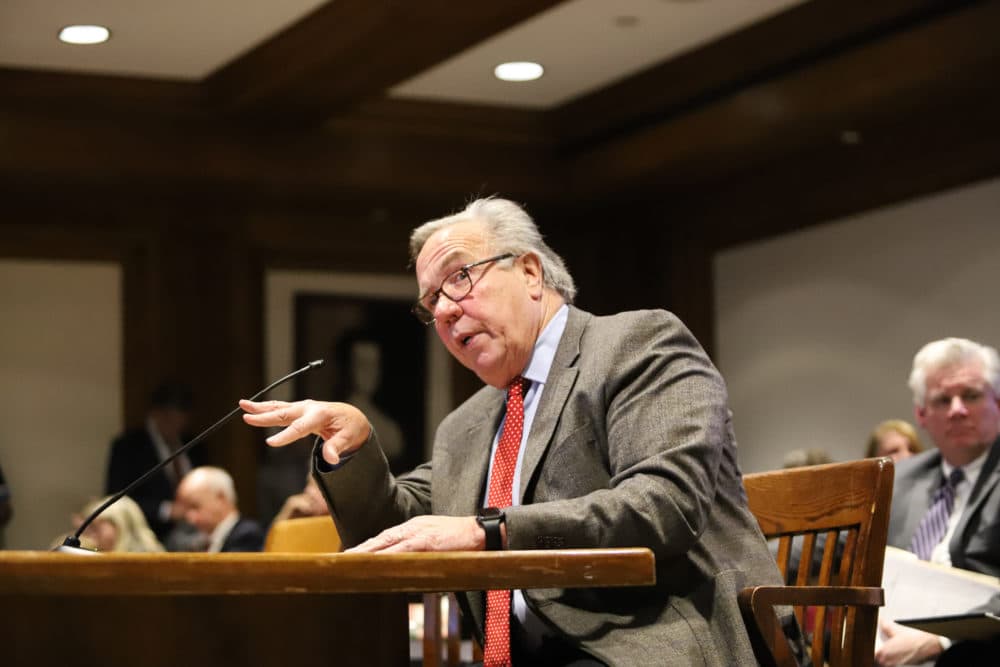Advertisement
Lawmakers Seek Safeguards On Nuclear Plant Decommissioning

Lawmakers are seeking additional influence over the decommissioning of the recently shuttered Pilgrim Nuclear Power Station, but a representative for the company conducting the work argued Wednesday that those attempts may be unconstitutional.
Tom Joyce, a lobbyist for Holtec Decommissioning International, said that bills imposing higher clean-up standards (H 2904/S 1949) or reforming how decommissioning is funded (S 1948/S 1992) would exceed the state's authority and infringe on the jurisdiction of the federal Nuclear Regulatory Commission.
Joyce told the Joint Committee on Telecommunications, Utilities and Energy that passage of the bills would likely prompt a lawsuit from Holtec, delaying the decommissioning process that the company has said will take seven years.
"As (lawmakers) attempt to regulate and to require certain criteria for the decommissioning of the nuclear power plant, they are, I would argue strenuously, in violation of the federal preemption doctrine of our United States Constitution," Joyce said. "I say that without hesitation."
Backers of the legislation, though, see the proposals as important steps to protect local stakeholders amid a process that has drawn criticism and a lawsuit from the attorney general.
Plymouth Republican Rep. Mathew Muratore, who filed one of the bills that would require decommissioning to meet stricter environmental standards, said his goal is to ensure the land is clean enough to appeal to potential businesses and avoid remaining vacant.
"(Holtec) says they follow the guidelines of the Nuclear Regulatory Commission, which is fine," Muratore told State House News Service. "We get that. But we want to make sure that not only do they meet those guidelines, but that they exceed them for the sake of the community and so that land can be an economic driver down the road."
The Pilgrim facility officially ended operations on May 31 after decades of generating power. In August, the NRC approved the transfer of Pilgrim's license from Entergy to Holtec International to handle its decommissioning.
Attorney General Maura Healey, with the backing of the Baker administration, filed a lawsuit seeking to block the transfer until the NRC holds a hearing on concerns about Holtec's ability to decommission the plant safely, its financial stability and the company's alleged involvement in a kickback scheme.
Advertisement
Speakers at Wednesday's committee hearing said the case, which also features the Pilgrim Watch group as a party, is still pending.
Other bills before the committee (S 1948/S 1992) would charge the owners of any nuclear power station in the state $25 million per year and stash the money into a fund managed by the state treasurer only to be used for post-closure activities.
Pilgrim Watch chair Mary Lampert said that money would serve as an "insurance policy" — if decommissioning concluded using the existing trust fund set aside for those purposes, the owners would get back the additional funding plus interest, she said. If not, the state would have a reserve ready to cover any shortfall.
Without a safety net backing up the more than $1 billion trust fund, Lampert said taxpayers would be on the hook.
"Who's going to pay the difference? We're going to pay the difference," she told the committee. "Holtec cannot be required to do so. Why can it not be required to do so? Because it is a limited liability company and you cannot get blood out of this stone."
Rep. Sarah Peake, a cosponsor of the bill, said Connecticut found itself footing a $480 million bill to complete decommissioning of the former Connecticut Yankee Nuclear Power Plant.
Like the legislation concerning cleanup standards, Joyce argued the funding proposals would unconstitutionally circumvent NRC authority.
"If any one of those bills is passed, it could very well have the likelihood of controversy, litigation, the consumption of much time, and result in not prompt decommissioning, but delaying decommissioning of the nuclear plant," he said.
Muratore and Lampert said they did not agree with that argument, with the latter arguing that the bills in question are all "money bills" and therefore grant the state authority to take additional action.
"States have the authority to enact a more conservative (environmental) standard if it applies after NRC has released the site because once the NRC has released the site, it no longer has authority, so there is not a question of preemption," Lampert said.
In his fiscal year 2021 budget unveiled Wednesday, Gov. Charlie Baker proposed language that would allow the Department of Public Health to assess operators of nuclear reactors in the process of being decommissioned — such as Holtec — for the costs of radiation monitoring and emergency planning associated with the project.